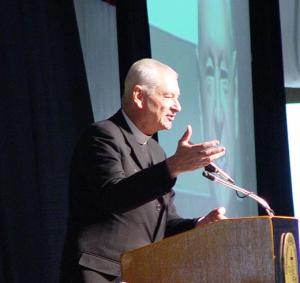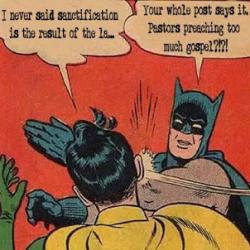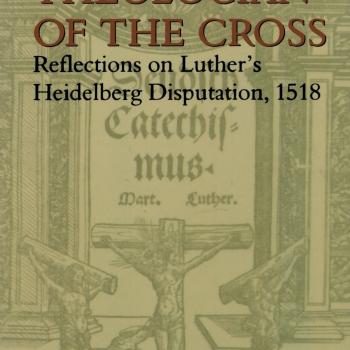
+++
Have you seen the video below or heard about it? Is it an overreaction? Grossly unfair? Or, maybe, just maybe, is there something important to it? (O’Sullivan’s First Law?)
This post is nothing other than a reflection not on that video per se, but rather on the title of this post, primarily with the help of a couple acquaintances from a Facebook group.
It, I think, is very meaty but also very digestible (understandable). I hope you find my report of this debate helpful.
Let us begin with the following statement. What should Christians think of it?:
“Power (and the status that goes with it) is nothing if not the ability to secure yourself, your possessions, and your posterity. Fine by itself, but it comes with many abuses.”
This seems like it could be in some real tension with what fellow Patheos blogger Scott McKnight, concerned about the idolatry of “Constantinianism,” has said: “The kingdom story [of the Bible] counters the culture of politics as the solution to our problems… We are summoned… to challenge all idolatrous stories that seek to diminish the kingship of King Jesus” (Kingdom Conspiracy, 62,63).

As a Lutheran, I had always thought that Luther’s teaching of the “Two Kingdoms” told us that the “Kingdom of the Left,” that is civil government, really did provide a temporary yet not insignificant solution to some of the problems all human beings face on earth: the sword of justice.
So while you are wrestling with those thoughts in your Spirit-led mind, get a load of this punchy comment, made by Thomas Lemke in response to a tweet I had made:
https://twitter.com/ThomasJLemke/status/1079027109912285190
I responded to this by saying “If this is the case, it appears that the Left as a whole is simply becoming more Marxist. And, as best I can tell, conservatism in American is still moving further left,” prompting a series of tweets from Thomas I took to be exceptionally thought-provoking. You can read them in his very short and accessible blog post titled “How Adopting Marxist Categories Leads to the Devil Made Me Do it Theology”.

Thomas’ main point is right there in the title of his article, but here are a few of his other points leading up to it:
- Where all moral questions boil down to [an axis of] Power <–> oppression then it becomes tantamount to blasphemy to speak of God in terms of his power (as it puts him dangerously close to the “immoral” side of the continuum).
- With a Marxist paradigm, “sinner=oppressed=’morally good’”. “His enemies can’t be his footstool — that would be oppression!”
- With the real victimizer being sin and not the one who sins, Jesus is identified with the oppressed to the exclusion of His veiled power: “’Glory’ is something a conqueror has. But only one who is oppressed bears a cross.”
- “Jesus’ death was not to atone for unrighteousness, writ large, but only to show that God is on the side of Moral Good, in that he is oppressed too”

Being a serious Lutheran, I naturally thought of a particular group in our midst who call themselves “Radical Lutherans”[i] (my last post took on their biggest straw man) and posted Thomas’ short piece on a small Facebook group of thoughtful Lutheran acquaintances, asking if anyone had a good critique of the article. One of those participants, a man we’ll call Georgios Siopilos, shared what I thought were some very wise words in response. You can read all of them in the post that I named, as provocatively as I could, “Radical Lutheranism is Bad, but its Not Necessarily Communism”.

In sum, Georgios is quite familiar with the effects of communist ideology, and so calling himself “an unhelpful purist,” wanted to make sure Thomas knew what real communist philosophy was/is: “Strictly speaking, capitalists, in Marxism, are not evil, or even oppressive, they too are ‘victims’ of the system, which itself is a necessary step to the next economic step in human civilization.”[ii]

Georgios then says that he thinks what Thomas is actually doing is “getting at the Adorno/Marcuse reworking of Marxism into, effectively, a political theology of power” (if you are getting lost at this point, Georgios is talking here about what some have called “cultural Marxism”. I came across a very helpful article about this topic a week ago called “Cultural Marxism is Real” here).

Thomas’ response to this post, another one of his own, was appreciative but at the same time basically came down to K.I.S.S. (“keep it simple stupid”): “I’m merely noting that certain (“Marxist”) presuppositions lead in certain directions; just as starting with a sugar base means you’re cooking something that will rot your teeth out”. In other words, most people don’t care about these subtle distinctions over things that have similar practical implications for real life, so there is no need for this kind of level of technical detail. Nor is this a bad thing: loss of precision, after all, also happens when the academic disciplines try to understand each other as well. Not only this, but such “[p]recision comes at the cost of time and attention; the latter two are in short supply, so sometimes ‘close enough’ has to be good enough.”

Some of the memorable zingers in his response are that “Before Marx, Radical Egalitarianism was an ideology. Since Marx, it’s become a religion,”[iv] “of course I’m not saying that the ‘Radical Lutherans’ all hide hammer-and-sickle necklaces under their collars,” and, the title of his blog post: “Ideas are Like GMO Corn”. What does that mean? Ideas are no more containable than genetically modified DNA is… they will spread, be adapted, interbreed, etc:[v]
So, sure, in the abstract world of ivory-tower thought, Marxism has nothing to do with power-oppression as an axis of morality. But as it seeped into the public it necessarily changed to adapt to the public’s categories, which caused the way it is articulated (and even subconsciously understood) to shift. Look at the Marxists of our day, such as Bernie Sanders and AOC, who are unmistakable moralists when it comes to the power-oppression axis.[vi]

Georgios’s response to this was fascinating, and immediately won Thomas’ heartfelt approval. Noting his relative poverty, he said that his tower is not ivory but made of fibreboard painted “eggshell”. Noting his own purposes in writing, he stated that his definition of “technical Marxism” was indeed pointless to Thomas’ purposes, but not his own! His own powerful point is worth repeating:
[I]t was Marxism, the actual technical thing, that caused nearly everyone not born in the Western hemisphere to have at least one relative either put to death or consigned to life in the gulag or re-education camps, and not the modern American metaphor on Marxism, which really is nothing but envy given the title of Marxism to create the illusion that a vice has become a philosophy.[vii]
Are the ideas of “post-modernism” and “Marxism” really a lot closer to home for all of us than we might imagine?
Georgios aims at our hearts and strikes:
There are indeed actual Marxists, as there are actual post-modernists, and I dislike them both intensely. But if the question is ‘what is the average American that expresses the ideas that we associate with post modernism and Marxism actually thinking?’ The answer is, in my opinion, surprisingly non-radical (this is, of course, excluding college students, and other uneducated people). Why are you post-modernist? ‘Well its not good to judge people.’ Why are you Marxist? ‘Its not fair that a bunch of powerful jackasses should have all this power and money when I work hard and have barely enough to pay rent.’
I hate to say it, but both of those ‘values’ are things you can find in Capra’s ‘It’s A Wonderful Life’ and the Andy Griffith Show. They are American values: minding your own business, and despising the haughty. They are values I approve of. But, like all values, they can be exploited (bold mine).

With that, he lays down the final boom. Our nation, he says, has indeed changed:
I would just say that the problem is not that people have converted to some distant and wicked ideology, but rather that, apart from any conversion, a distant and wicked ideology has found a way to twist normal, decent, American and Christian convictions in such a way that in the end they look almost nothing like how they did in the beginning.

Is this true? If so, what does this mean for theology? Our teaching of God’s law and his gospel?
I will let Georgios, channeling C.S. Lewis’ description of Aslan, give us the final word.

God is powerful. God is also not safe. He makes rivers of blood and breaks nations with the rod of his mouth. The Hebrew word of a god, ‘el’ literally just means ‘a power’, hence why older translators rendered the term ‘elohim’ as ‘the Almighty’, that is, he who has all mights, all powers.
If power is to be condemned, it is difficult to understand why our hymns demand we ascribe to the Lord ‘All glory, honor and dominion’, and why nearly every Christmas carol declares the greatness of the coming of ‘the king’, and why God ‘holds the nations in derision’.
Rightly does it say we should ‘rejoice with trembling’, for God is terrifying. Only when one understands the terror of God can one understand the pathos of the phrase ‘the Word became flesh and dwelt among us’, and why children and adults both sing ‘I love thee Lord Jesus, look down from the sky.’ It is the very reality of the dread power of God taking the form of the dear mercy of Christ that makes fear and love unite, and causes ‘justice and mercy to kiss one another.’
If one denies either the power of God, or the love of God, one has denied the God we worship.

FIN
Images:
Mendenall pic: https://allenmendenhall.com/photo-gallery/ ; Andy Griffith: https://en.wikipedia.org/wiki/Andy_Griffith ; Aslan: https://en.wikipedia.org/wiki/Aslan
Notes:
[i] In sum like “Radical Lutheranism,” overlaps a bit theologically with the hyper/radical grace movement among evangelical Christians, which, as best as I can tell, was more prominent in online discussions and elsewhere a few years ago.
[ii] Note: this was also very briefly touched on in the latest post at my blog: “The Hi-Jacking of Tucker Carlson’s Concerns: Is There a “Gynocentric” Agenda?”: “If the father of a mother’s children does not look to provide for, treasure, and protect for his own, they must look to man. And yes, I literally mean man. Men. Usually “the man” though, meaning those with political power… Basically everyone knows this, but all either suppress it or don’t talk about it, or talk around it endlessly. Marx certainly understood this. He saw capitalism destroying all the traditional bonds of society, particularly the natural family. There were definitely things about captialism that upset him, but this, to be sure, wasn’t one of them.”
[iii] I’d note that many Marxists also, while suspicious of power, also believe that it is good when good people possess it. We should note here that most all Marxists believe that human nature is intrinsically good, and not sinful.
[iv] Cue Adam Proctor and other socialists ; note this fascinating, God-haunted conversation by these young and restless red souls.
[v] More:
“Philosophers like to pretend that their ideas can be held and perpetually maintained in a just-so way, but this is no more true than genetically modified DNA can, once sown in a field of crops, be contained in its own little plot. It will spread, and it will be adapted in an endless chain of interbreeding.”
[vi] He goes on: “You can ascribe another name to it (such as “the Adorno/Marcuse reworking of Marxism”), and that may be a useful distinction in an academic sense. But at some point these names get out of hand and, for our purposes in the public, it’s a distinction without a difference….”
[vii] More complete quote: “When Mussolini gave speeches pitching Fascism, he didn’t just say ‘We’ll be racist, and then I’ll be authoritarian.’ It was a system thought out to the specifics, and ultimately, it is that system, with all its specifics, and not our cartoon metaphor of it, that plunged the earth into the most violent war in history. Similarly, it was Marxism, the actual technical thing, that caused nearly everyone not born in the Western hemisphere to have at least one relative either put to death or consigned to life in the gulag or re-education camps, and not the modern American metaphor on Marxism, which really is nothing but envy given the title of Marxism to create the illusion that a vice has become a philosophy.”











